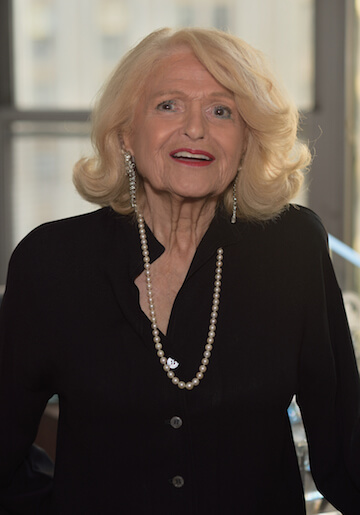On their campaign website splash pages, both Democratic Congressman Sean Patrick Maloney and Nan Hayworth, a former Republican representative, cast themselves against the background of the Hudson River and the Tappan Zee Bridge. | SEANMALONEY.COM? NANHAYWORTH.COM
Democrat Sean Patrick Maloney was elected New York State’s first openly gay member of Congress two years ago after challenging a Republican incumbent in one of the few competitive US House districts in the nation.
With President Barack Obama expected to handily carry New York State in 2012, Maloney nevertheless ran as a “Clinton Democrat.” With Obama not on the ballot this year — and suffering some of the lowest poll numbers of his six years as president — Maloney, not surprisingly, is once again running as a “Clinton Democrat.”
Maloney, who is 48, in fact spent three years working as a White House staffer during the Clinton administration and, of course, for a Democrat running in New York there’s not much better a name to invoke. In his tenure in the House, where he represents Orange and Rockland Counties northwest of the city as well as portions of Westchester and Dutchess Counties due north, he has not shrunk from highlighting the differences he’s had with the current Democratic president.
As anger over 2013 shutdown votes cools, gay Dem focuses rematch on beating back “radical Tea Party” ideas
At times, especially on some votes against the Affordable Health Care Act, or Obamacare, during last fall’s budget showdown and government shutdown, Maloney’s opposition to the president has sparked anger among groups that backed his 2012 victory, especially labor unions.
But in a rerun against his opponent from that year, Republican Nan Hayworth, who has tried to walk away from her 2010 embrace of Tea Party groups but has otherwise not much varied her campaign playbook, Maloney’s centrist course — in which he emphasizes working across the aisle as an antidote to gridlock — may be serving him well politically. He faces a candidate who, in debates, inveighs again and again against the Democrats’ “agenda of burdens” — a shorthand formulation for her broad-based philosophical objection to government being an active player in the economy. And Hayworth has largely ceded issues of critical interest to women voters to him. Maloney may be positioned to withstand what could be a bad day for his party on November 4.
That’s not a certainty, though. A September poll out of Siena College gave the Democrat an eight-point lead. Successive polls released by the Hayworth campaign and conducted on its behalf by Public Opinion Strategies put the race at four points in mid-October and tied roughly a week later. Crediting a candidate’s internals is risky, but the Cook Political Report, in assessing what it terms 64 “competitive” House races — out of 435 in total — changed its rating this week in the Maloney-Hayworth rematch from “lean Democratic” to “toss up.”
To be sure, New York’s 18th Congressional District is one of an increasingly rare breed in the US — a true swing district. Maloney won two years ago with 51.7 percent of the vote, just ahead of Obama’s 51.4 percent showing there. Hayworth served only one term before her defeat by Maloney. In the 2010 Tea Party sweep election — in a district later redrawn based on that year’s Census — she ousted a two-term Democrat who had ridden the 2006 Democratic wave to end decades of GOP dominance there.
Maloney and Hayworth have met in a series of debates this year, including several newspaper editorial board face-offs streamed online, and the encounters are difficult to distinguish from those in 2012.
The Democrat talks about working across the aisle, serving a district where voters are “sick and tired of partisan fighting and gridlock in Washington.” Maloney touts endorsements from two local GOP state senators — Greg Ball, who is retiring, and Bill Larkin, to whom he returned the favor — and frequently mentions how he’s worked on bipartisan initiatives with Republican Congressman Chris Gibson, who represents the neighboring 19th District. (Gibson is running well ahead in the polls against the other gay Democratic Sean running for the House from New York — investor and activist Sean Eldridge, whose husband is Facebook co-founder and New Republic owner Chris Hughes.)
Maloney also makes frequent mention of Hayworth’s “radical Tea Party” ideas.
For her part, Hayworth has apparently decided former House Speaker Nancy Pelosi is more toxic in the district than Obama; she repeatedly reminds voters that Maloney’s first vote in Congress was to return the California Democrat to the speakership and typically castigates the opposition party for its “Pelosi-Obama agenda of burdens.” The Hudson Valley, she charges, is buried in “an avalanche of mandates” coming down from the federal government. Maloney’s proposal to close the controversial Indian Point nuclear power plant will not only drive up electricity costs, Hayworth says, it will also “create more pollution.”
The Republican voices a not uncommon mistrust of government solutions and burdens and taps into the current sour mood about Obama, but at many turns Maloney outflanks her with his own dissatisfactions with the administration, managing to snatch back a good deal of the turf she is trying to stake out. While she warns that Indian Point is essential to keeping down energy costs, Maloney charged, in a WAMC radio interview, that she was “asleep at the switch” as the Federal Energy Regulatory Commission approved a public utilities rate structure in the Hudson Valley with “reckless” rates. He took on the administration, he explains, and got the commission’s attention with the assistance of Republican Gibson.
Both Hayworth and Maloney are bluntly critical of what they say is the administration’s failure to articulate a clear policy toward the rise of ISIS, terrorists laying claim to speak for an Islamic State of Iraq and Syria, but Maloney rules out any deployment of US ground forces, something the more hawkish Hayworth says might be necessary — assuming, of course, the president satisfies her on his overall policy aims.
And both candidates, faulting the administration’s response to Ebola, call for an end of flights from the West African nations hardest hit, though Maloney has not joined in Hayworth’s call for the resignation of Dr. Thomas Frieden, who heads the Centers for Disease Control and Prevention.
Nothing, however, animates Hayworth — who is an ophthalmologist whose husband is CEO of a Westchester County medical group — more than Obamacare. “This law is a disaster and the individual mandate is a disaster,” she said in an October 21 debate before the Orange County Times Herald-Record editorial board. At the same time, she is careful to endorse many of the benefits most attractive about the Affordable Care Act (ACA). Women shouldn’t pay more for insurance then men, she says, and those 26 or younger should be able to stay on their parents’ health insurance plan. Coverage should not be denied due to a pre-existing condition.
“She would love it if all those things were out there, but she just doesn’t want do anything about it,” Maloney fired back. Hayworth has no recommendations for changing the law, he charges, she simply wants to scrap it — and that would lead to “gridlock.” When she argues that the ACA cut $716 billion from Medicare, Maloney responds that the Paul Ryan budget she supported while in the House would have hit Medicare on a similar scale.
While arguing that Hayworth offers no alternative to the ACA, he also distances himself from Obamacare’s most controversial aspects. He doesn’t support the Medicare cut, Maloney says, and voted against the individual mandate and a medical device tax. In fact, the Democrat argues, he “voted against the president 44 percent of the time” on Obamacare. If Hayworth fails to offer any kind of plan to achieve the outcomes she claims she favors, Maloney does not explain how to maintain the ACA without those elements he says he opposes.
Maloney’s willingness to break ranks on Obamacare created a storm among progressive allies last fall when House Republicans forced a government shutdown over its demand that the budget incorporate a delay in the ACA’s implementation. In a decisive September 30 vote, after twice siding with his fellow Democrats, he joined eight others who defected to support the GOP in a vote that essentially left the government without the money to keep it open. He then joined Republicans in a string of votes that would have incrementally and selectively reopened government agencies — proposals opposed by the Democratic leadership, which eventually succeeded in forcing Speaker John Boehner to blink.
Maloney now campaigns on being one of the top three percent in terms of bipartisanship in Congress, but he took heat at the time of the budget debacle.
“Being a Democrat means something,” Khan Shoieb, a spokesman for the local Working Families Party chapter, told Gay City News, “and it’s the wrong moment to abandon progressives. Voting with the Tea Party to shut down the government has consequences.”
Scott Sommer, the New York area regional director of the United Auto Workers, told Gay City News, “We’re disappointed on some of his votes on the government shutdown. Once this crisis is over, we’ll have a chance to sit down with the congressman and voice our concerns, and hopefully he’ll do things differently next time.”
A year later, Maloney is once again running on the Working Families Party ballot line and enjoys the endorsement of the UAW, among many major unions. Maloney may have wavered in his fidelity to the ACA, but his attacks on Hayworth’s posture pays progressive dividends when he argues she has also advocated turning Medicare into a voucher program and privatizing Social Security.
Maloney also enjoys strong support from women’s groups. In contrast, Hayworth scores well with anti-abortion groups, and the Democrat ties her to efforts by “the House Tea Party leadership” to defund Planned Parenthood. Asked repeatedly by the Times Herald-Record whether she supports the Paycheck Fairness Act, which aims to strengthen existing law barring wage differentials between men and women doing the same job, the Republican dodged numerous times — saying, “I support equal pay for equal work” — before acknowledging she opposes the proposed legislation.
Nowhere, though, did Hayworth seem more off her game than when marriage equality — an issue she insisted is “personal,” given that she has a gay son — came up during a debate before the Poughkeepsie Journal editorial board. Voicing satisfaction that New York allows same-sex couples to marry and the Supreme Court ruled against the Defense of Marriage Act last year, Hayworth argued, “The federal government should not impose a definition of marriage on the states.” Then, she contradicted herself — and raised a question about whether she understood last year’s DOMA ruling — by saying that a state should recognize any other state’s marriages, “just like a driver’s license.”
Maloney was ready to pounce.
“The congresswoman’s position is both wrong and incoherent,” he said, noting that Hayworth had answered “no” on whether there was a federal constitutional right to marry. Then, cutting Hayworth off as she tried to interject, Maloney said, “On a subject as personal as my marriage, how dare you say that you respect our marriage and wish us well but if we go down to Alabama you’re okay that they discriminate against us? If you are going to represent the State of New York, you have to come to terms with the fact that you are treating my family as less than your own.”




































